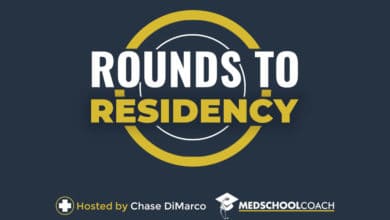Dr. Francis Yoo talks about the importance of emotional intelligence in medical practice & applying “attention” and “intention” within a clinical setting.
- [00:53] How Dr. Yoo Is Changing Medicine for the Better
- [03:55] Applying “Attention” and “Intention” Within a Clinical Setting
- [08:00] The Importance of Emotional Intelligence in Student Learning
- [12:43] Emotional Intelligence in the Future of Medical Education
- [16:16] Developing Rapport Between Students and Patients
- [20:09] The Myers-Briggs Type Indicator and the Enneagram Type
“Attention” and “Intention”
A major area of focus for Dr. Yoo is the lack of “attention” and “intention” in practice. Applying “attention” within a clinical setting can be as simple as a student or physician attending to a patient, beyond the strictly clinical aspects of a visit, or an educator attending to a student. “Intention” could involve simply intentionally sharing something useful within those settings.
Dr Yoo. describes “magic” as attention and intention modified by belief, emotion, imagination and clarity.
Emotional Intelligence in Learning and Medicine
Emotional intelligence is a vital part of student learning, particularly for medical students. Dr. Yoo describes emotional intelligence as a set of skills that can be acquired and developed, like any other set of skills. Actively learning and using this particular set of skills reminds students that, while they are in a clinical setting, both the patient and student or physician are human beings first. This acknowledgement allows the student to accept that not everything will be perfect and allows them to draw on their other skills to optimise a clinical experience.
The Future of Medical Education
Residency programs are facing a challenge in the face of the step exam going pass/fail. They may be looking for other yardsticks to evaluate residents and their competencies. Looking at more aspects of students and their abilities requires more work, especially in the absence of step exam scores, but matching is likely to become more expedient for both the practice and the student. More research will yield better matches for residency programs.
Dr. Yoo has found it valuable to apply the skills he’s gained from experience in other areas to his medical practice. These skills include branding and marketing and are not generally expressed requisites for residents but may become more useful as a marker for matching in residency programs.
Helping Students Build Rapport with Patients
Dr. Yoo attests that both top-down and bottom-up communication is essential for properly integrating the student in a hospital or private practice and developing an ability to connect with patients. In an ideal clinical setting, the residents, nursing staff and preceptor are aware of the needs of the students and are actively involved in inducting the student into the practice and the culture of the practice. This deliberate human intervention reminds the student of the humanness of a real-life setting. Making either the student or preceptor solely responsible for the integration of the student is unlikely to yield significant results.
MBTI and Enneagrams
MBTI and the Enneagram are both models of the human psyche and behaviour. MBTI (Myers-Briggs Type Indicator) is based on the work of psychiatrist Carl Jung on the theory of personality types. The MBTI intends to make Jung’s theory useful and understandable in people’s lives. MBTI is used extensively in personal and executive coaching, as well as team development. The Enneagram is a model which attempts to describe people in terms of types and is based on their motivations and fears.
Check out Dr. Yoo’s website to browse his blog and shop his books. Check out his LinkedIn, Facebook, Instagram, and Twitter profiles.
Sign up for a Free Coaching session with Chase DiMarco, sponsored by Prospective Doctor! You can also join the Med Mnemonist Mastermind FB Group today and learn more about study methods, memory techniques, and MORE! Do check out Read This Before Medical School. Like our FreeMedEd Facebook page and find our Medical Micro Course, Blog posts, and Podcasts at FreeMedEd.org! Feel free to Email any Questions or Comments.
